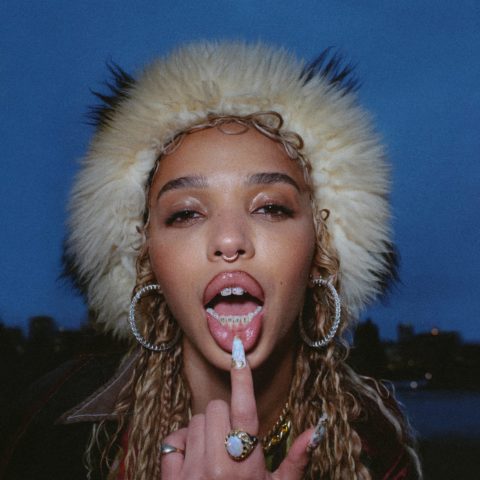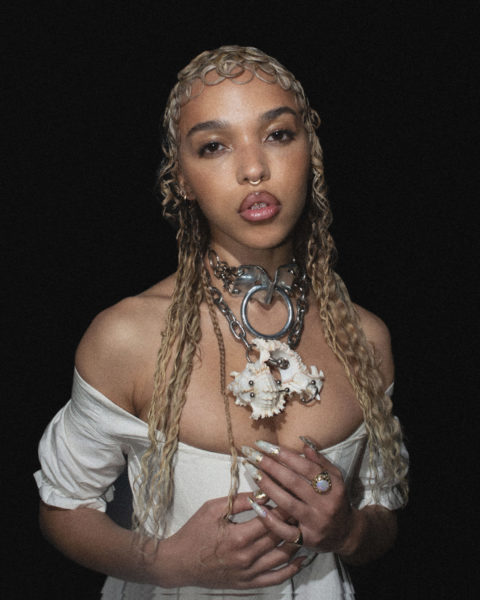
Photography courtesy of Orograph
The singer’s new mixtape is an alluring self-reflective journey.
By Dina Lobo
Date January 27, 2022
Listening to FKA Twigs’ newly released mixtape Caprisongs, where sound bytes of audio appear at the start or end of almost every track, it can feel like you’re hiding between the pages of her personal reflections, or overhearing a conversation between friends from inside her London home. In some sound bytes, a friend motivates you, saying, “This is the year of greatness, bruv, and bein’ free, I’m telling you.” Then in another, a girlfriend tells you that these toxic boys aren’t worthy of you, like in the song “Oh My Love.”
The most striking byte that perhaps best encapsulates Caprisongs is when Twigs directly addresses her intentions in making this mixtape. In the opening track, “Ride the Dragon,” she softly lures us in and says, “When I feel you, I feel me, and when I feel me, it feels good,” already weaving us into the fabric of her newest body of work and its varying emotional patterns all before hearing the first verse.
FKA Twigs has never shied away from the theatre-like grandiose of her art, serving us consistent effort and detail in style, dance and visuals (she is a Capricorn, after all). In her second studio album, Magdalene, the then more guarded interdisciplinary artist surrendered to the healing in heartbreak. And now, in Caprisongs, she strips back a few more layers, this time evolving the voice of the divine feminine that existed in Magdaelene and moving into a space where she can celebrate her joy and let loose in the messiness of life.
 Photography courtesy of Orograph
Photography courtesy of Orograph
FASHION spoke to FKA Twigs about the creation of Caprisongs, collaborating with artists (including The Weeknd) and her journey back to herself.
How do you feel releasing Caprisongs? I know you worked on this during lockdown and through FaceTime. Did it felt like a different process from your other albums?
I think there’s a bigger energetic response to this mixtape [compared to] to my others. The mood of it is very inviting and it has a [feeling of] community and more joyful togetherness.
Listen, I’m over the moon. It’s always a massive achievement to release anything into the world and so the fact that this is my third long-form piece of music, I’m grateful.
You’ve got nine features on this album! How do you go about picking the artists you wanted to collaborate with? Are they artists you’ve always wanted to work with, or was it more of an impulsive energy?
A little bit of both to be honest. I mean, the whole point of this album is to not overthink it. That was the challenge for me as someone who is a notorious perfectionist. I spent four years doing Magdalene! It’s a challenge for me to make something in 18 months or less and put it out and have a carefree aspect to it.
I was isolating alone, so the more people messaging me, the more busy things I had to do, the more MP3s I was getting in my emails, the more voice notes I was getting, the more different things I had to do to occupy myself, the easier the lockdown was for me. I think sometimes I collaborated with people because it was nice being on FaceTime talking to somebody…It’s not about the need for help, but the joy of being together and creating.
 Photography courtesy of Orograph
Photography courtesy of Orograph
What was the process of collaborating with The Weeknd for your first single, “Tears in the Club”?
I had written “Tears in the Club” and done the sketch of it on the piano with a tiny melody I did with Arca. El Quincho (producer) heard it and we both said The Weeknd would sound great, but I was like, “Listen, The Weeknd wouldn’t want to be on my song. That seems far fetched — he’s the biggest pop star in the world,” and he’s like, “You’re FKA Twigs. You’re crazy. Just message him.” I was so shy…That’s where the line from [my song] “Light Beamers” comes from — “Baby, ain’t nobody die from a ‘no,’” because if you don’t ask, you don’t get. I asked Abel and he was brilliant and he sent me vocals back in two weeks.
I’ve noticed you always acknowledge the artists you collaborate with (be it dancers, stylists or makeup artists). How important are those relationships to your artistic process?
It’s everything. It really does take a village when you’re raising an art baby. Because I feel confident in myself, it’s a joy to highlight other people that help me make my dreams come true and I couldn’t do it without the dancers and stylists.
We put “Tears in the Club” [music video choreography] together in two days…I had bronchitis and it was the first video I did where I was on steroids and antibiotics. I was really struggling, so the dancers helped me up — literally. You know when you’re ill and you can’t think properly? I was trying to learn the routine and my brain was all wavy. I couldn’t even think of the steps, I felt insane.
Yeah, it feels like you’re dreaming
It was exactly like that! There were a few [dancers] that were my backbone.
I think to not give credit where it’s due is maybe a sign of insecurity because, why not? I wouldn’t want to do this if I couldn’t be around people.
It’s the best feeling in the world when someone has a better idea than you. No egos in the room. When you come with a seven and you work with a team and they take it to nine or ten. It’s just like the best feeling in the whole world. I’m incredibly grateful for my creative team.
 Photography courtesy of Orograph
Photography courtesy of Orograph
The album had an effortless power about it and the video for “Ride the Dragon” reflected that. What are your visuals going to look like for the rest of the album?
As I’ve developed as a musical artist, I’ve also developed as a visual artist.
I was one of the first artists who figured out that people were listening to music on YouTube, so I started to make these GIF-like music videos and I’d release a visual for every single song I put out…I’m going back to those roots.
Our attention spans aren’t really that great at the moment. We’ve been online a lot and we’re looking at short form content. [On] TikTok, for example, it’s seven second videos that are the most popular…There’s a sadness to that, but there’s also an excitement. I want to challenge myself to stay current and make visuals that fit into where we are in society right now. The thing I like about it is there’s a punk element to it….Maybe it’s time to disrupt it and see how short we can make videos. In a few years they might get longer again.
@fkatwigs when ur giving chaotic good but ur friends encourage u to be chaotic evil #caprisongs #jealousy jealousy (feat. rema) – FKA twigs
Style and costume play a big part in the art you create. How would you describe the style of this era of Caprisongs? You’ve stated this album is a journey back to yourself. How is your style a reflection of this?
Caprisongs is about going back to my roots, my heritage and my Jamaican side.
I grew up in a really white area. I was the only child that looked like me. Then moving to London and feeling a real sense of community was the discovery of being beautiful.
Where I was from, I was the ”other,” and then I went to Croydon College and I was normal.…For me that’s what the mixtape is about. The style is a reflection of me discovering myself in Croydon and moving to East London; going to Jamaica for the first time to hang out with my grandparents and learn about that side of myself.
Mathew and I, my stylist, spoke a lot about what Magdalene would look like in the real world if she crashed in London, as in the aesthetic and album of Magdelene…It’s about taking the place where I’ve been aesthetically and grounding it in my life.







